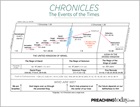Skill Builders
Article
Preach to the Fatherless

I write this article from the perspective of someone who was in many ways fatherless and from someone who is childless.
My father was an absentee father who was swept up into a world of alcoholism. His absenteeism was palpable. From not spending time with his children to ignoring their safety while driving drunk, my father was not physically nor emotionally present. When he was around, he was angry or a raging drunk. I confess that I don’t remember a pleasant moment with him. He was enveloped in a world of bitterness toward his own mother who gave him birth while single—a truth he didn’t learn till he was in his late teens. As a result, he turned his disappointment to anger to alcohol.
I’m also fatherless. My wife and I tried unsuccessfully to have children. But the Lord didn’t bless us in this way. So, when I approach Father’s Day, I admit that I regularly experience yearning, longing, and emptiness—perhaps even a flicker of regret.
When I served as a pastor, I didn’t ignore Father’s Day simply because of my own experience of fatherlessness. Instead, I tried to learn how I could recast some of the prevalent practices that take place in many churches around this special day. I want to share with you some considerations for preaching to the fatherless—amid preaching to those who have engaged fathers and those who are fathers.
Remember that the Fatherless Are in Our Congregations
This consideration might be simple and or even too obvious. But as an experienced listener, there’s a sensitivity factor that some preachers seem to lack when it comes to observances like Father’s Day or Mother’s Day. What I’ve sensed is an assumption that if the pastor (male) is married with children, every other adult male in the congregation is married with children.
Yet, from where I sit it strikes me that the pastor who is fatherless or single tends to be the one who is ready to think outside the typical Father’s Day box to navigate the celebration of the holiday. That pastor is most likely aware of the landmines that can be avoided when celebrating dads. I know it was the case for me.
The fatherless in your congregation may include those who never knew their father, the adopted, the divorced, men who weren’t able to father children, or whose spouse is unable to bear children. The emphasis on family that is prevalent seems to suggest that the average family is made up of a stable, married couple, with 2.5 children—happy smiling folks who have it all together.
That wasn’t the case in my own life and in the churches I served. Often half of the men and women in the congregation were singed by divorce. Their families were marred by the difficulties of single-parenthood and financial challenges, absent or no father—or many fathers, and a confusion as to who and what makes up a family. Throw into this mix the celebration of Father’s Day.
Let me suggest that when you speak to your congregation try to be sensitive to the fatherless. Your words and tone can communicate sensitivity and care. Assume that in your congregation there are families that don’t meet the perfect stereotype.
Approach Father’s Day from a Son’s Perspective
My home church taught me a change in perspective when it comes to honoring fathers. This rural church in western Pennsylvania years ago began a practice of hosting a banquet for Father’s Day. Instead of calling it a Father’s Day dinner, they reformed the perception and changed the title to the “All Sons Banquet.” The shift took the focus away from a traditional way of celebrating Father’s Day to that of celebrating sonship. Everyone was included. Every male is a son, and every son has a father—good or bad.
Yes, I realize that this modification might be a minor move, for in my case, I don’t have any sons, but the “All Sons Banquet” seems more inclusive for all the males in the church, for I am a son. Consider all sons.
When You Preach Be Honest About Fathers in the Bible
After having preached on Father’s Day and listened over the years to Father’s Day sermons, and in view of our cultural moment, we must be honest that we are hard pressed to find perfect fathers in the Bible. Jacob was a trickster, David was an adulterer, and Paul was single—but fathered many churches.
In many ways the reality of uneven biblical father models is comforting because it reminds us that we can’t force the realities of the text into a mold that is shaped by a preconceived perfect family shape. Biblical lives were messy. Our lives are messy. Yet the biblical men and women of the past have the same hope that we have today—a God who is Father of the fatherless, a God who is Father over all.
When you Pray, Remember the Fatherless
Often pastoral prayers reveal an ideal family situation that rarely reflects the composition of one’s congregation. When leading in prayers not only for Father’s Day but also throughout the year, consider well your words.
“We thank God for our fathers,” may seem innocent enough. Try not to allow your prayers to ooze with sentimentality. Sure, I can thank God that my father gave me birth, but I wrestle with the rest.
One way to approach prayer is to acknowledge that even though one’s earthly father might have been the cause of disappointment or difficulty or disgrace in a person’s life, we can find encouragement in recognizing God as our Father—the most honored and best Father of them all.
When Jesus taught his disciples to pray, he called them to address God as Father. He told his followers, “This is how you should pray: ‘Our Father in heaven …’” (Matt. 6:9). Our Lord set a precedent for those who have fathers and all the fatherless, for we have a perfect heavenly Father who knows what we need. Keep in mind the fatherless when you pray.
A Father to the Fatherless
The psalmist reminds us that the Lord is “a father to the fatherless, a defender of widows, is God in his holy dwelling” (Ps. 68:5). This is a truth that many of us embrace—and has deep meaning for us. I came to realize that although my earthly father was wanting, my heavenly Father has everything I need.
How was this displayed in my life? That country Baptist church I mentioned at the beginning of this article had several men in it who were like a father to me, and the Lord added to that legacy with other men who since then mentored me, loved me, taught me, like one of their sons. They demonstrated my heavenly Father’s love. Put another way, the characteristics of my heavenly Father were in these men whom the Lord used in my life to father me, for which I’m eternally grateful.
There was the elderly turkey farmer Dale who taught me what a Christian marriage was like. Jim demonstrated a love for family. And then there was the factory worker Dave who modeled for me a love for God’s Word. Pastor LeVan led me to Christ and showed me how to be a pastor. Later, Ken Swetland shaped Christ in me in countless ways, as did Haddon Robinson. God the Father’s fingerprints are all over me through fathers like them.
The model of these fathers and the priority of discipleship led me to mentor men and women. Some of them, too, are fatherless in one way or another. Even though I’ve not had the privilege of fathering children, I’ve had the pleasure of loving these men and women, hopefully shaping them in their character and their love for Christ. Although Father’s Day might be a bit awkward for me, I have spiritual sons and daughters into whom I’ve poured my life. And that has made all the difference. Every time I stand to preach, I’m reminded to preach to the fatherless.
Scott M. Gibson is the Professor of Preaching and holder of the David E. Garland Chair of Preaching at Baylor University/Truett Seminary in Waco, Texas. He also served as the Haddon W. Robinson Professor of Preaching and Ministry at Gordon-Conwell Theological Seminary in South Hamilton, Massachusetts, where he was on faculty for twenty-seven years.











